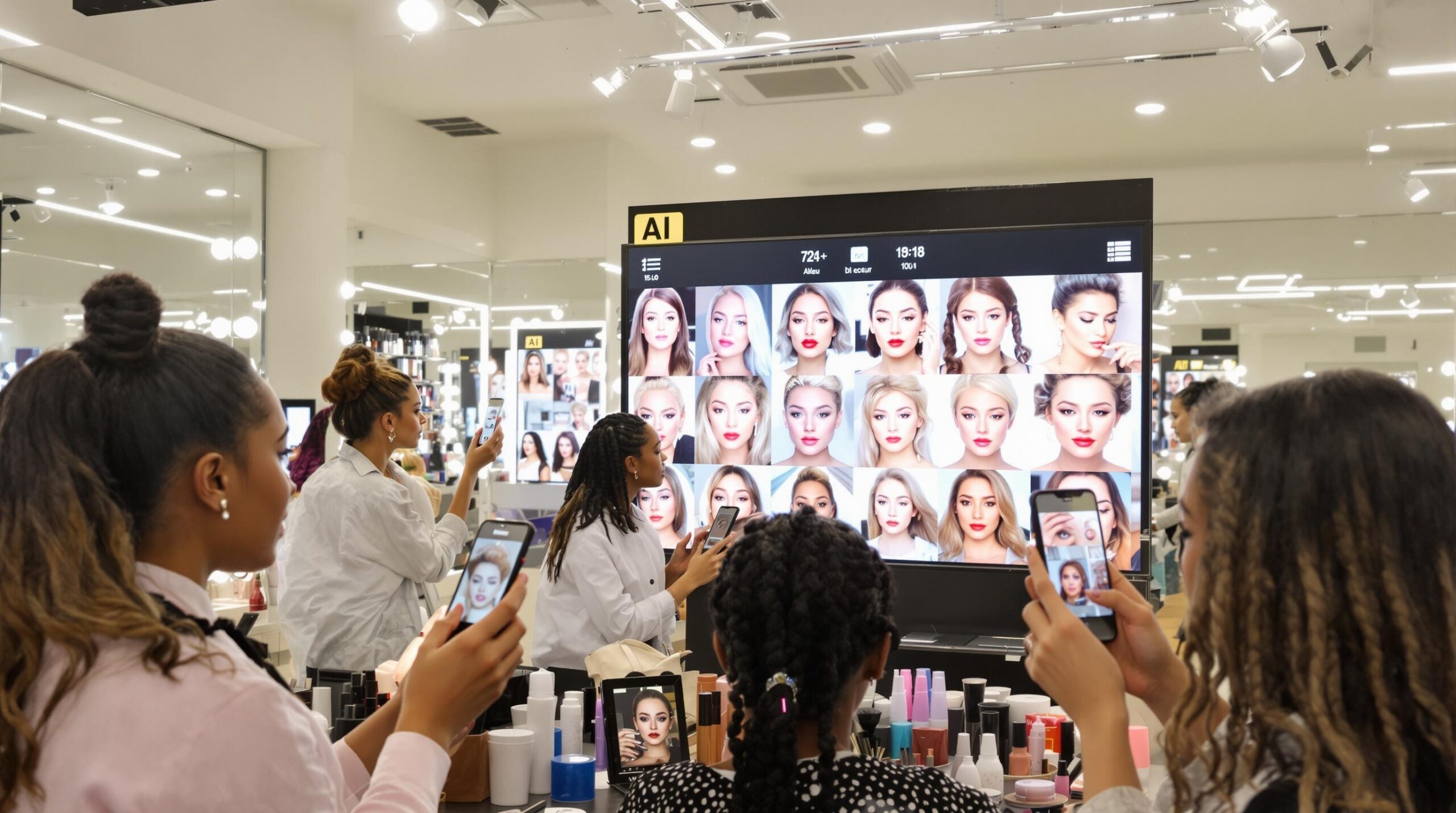Artificial intelligence (AI) has profoundly transformed numerous sectors, and the beauty industry is no exception. Advanced technologies now offer consumers personalized beauty experiences through AI-driven makeup apps. These digital platforms have begun shifting the traditional dynamics of beauty marketing, sales, and engagement.
Revolutionizing Consumer Experience
AI-driven makeup apps have enhanced the way consumers interact with beauty products. They allow users to try lipstick, eyeshadow, and other makeup virtually. By uploading a selfie, users can experiment with diverse looks without applying any physical products. Such experiences make makeup more accessible and user-friendly, especially for those uncertain about purchasing new products.
These virtual try-ons eliminate the need for in-store testers, which some have deemed unhygienic. Consumers can explore countless looks from the comfort of their homes. This convenience elevates user satisfaction and boosts engagement by making the beauty experience more interactive.
Personalization at the Forefront
Personalization has taken center stage in the beauty industry’s transformation, driven by AI. Makeup apps can analyze users’ skin tones, facial features, and even beauty routines. Based on these analyses, these apps recommend suitable products and customized beauty regimes.
This level of personalization was impractical a few years ago. Today, customers appreciate brands that understand their unique needs and preferences. Such tailored recommendations create lasting brand loyalty and increase the chances of purchase conversion.
Streamlining the Purchasing Process
Seamlessly integrating these apps with e-commerce platforms further simplifies the shopping experience. Users can virtually try a product and purchase it directly with minimal effort. This streamlined approach reduces decision fatigue, which can delay purchases.
By bridging the gap between exploration and acquisition, AI-driven makeup apps cater to modern consumers’ convenience needs. They keep pace with the digital shift in consumer behavior, impacting how beauty brands market their products.
Data-Driven Insights and Analytics
Harnessing AI also provides beauty brands valuable insights into consumer behavior and preferences. As users interact with these apps, they generate a wealth of data that brands can analyze. This information reveals trending preferences and popular products, aiding strategic product development.
By better understanding their audience, brands can refine their marketing strategies and tailor their offerings. Consequently, data-driven decision-making enhances operational efficiencies and optimizes inventory management.
Promoting Inclusivity and Diversity
One of the most notable impacts of AI-driven makeup apps is the promotion of inclusivity and diversity in beauty. These platforms offer various shades and styles, catering to various skin tones and preferences. Consumers previously felt overlooked by the beauty industry now find options that suit their needs.
By visualizing how products look on different skin tones, brands expand their customer base and build a reputation for inclusivity. Promoting diversity encourages positive brand associations and can significantly enhance consumer trust and loyalty.
Shaping the Future of Retail Experiences
The rise of virtual try-ons signals a shift in how retail experiences are structured. AI-driven makeup apps reduce the need for physical store visits, affecting brick-and-mortar sales. As a result, retailers must adapt by integrating digital tools into their offerings.
Stores are exploring augmented reality (AR) kiosks and virtual makeup stations to provide engaging in-store experiences. By blending physical and digital interactions, retailers can remain relevant and attract tech-savvy consumers.
Impact on Traditional Branding and Advertising
The proliferation of AI-driven apps is challenging traditional branding and advertising strategies. Influencer marketing, tutorials, and reviews still sway, but consumers increasingly trust personal experiences with virtual apps. This shift diminishes the power of celebrity endorsements while elevating authentic user interaction as a key marketing tool.
As a result, beauty brands are adjusting their approaches by prioritizing user-generated content and actively engaging with consumers online. This transformation creates a more dynamic and genuine brand narrative that resonates with modern audiences.
Ethical Considerations and Data Privacy
The widespread adoption of AI-driven apps brings forth ethical considerations. Data privacy remains a primary concern since these apps collect and store personal data. Consumers demand transparency regarding how their information is used and shared.
Brands can build trust by implementing robust privacy policies and ensuring compliance with regulations. Clear communication and obtaining user consent are critical to fostering a trustworthy relationship with the consumer.
Potential Job Displacement Concerns
Although AI and these new technologies bring numerous benefits, there are concerns about potential job displacement. As digital tools replace some in-store roles, the industry must navigate this shift thoughtfully. Upskilling retail employees to handle technology-driven solutions, like virtual consultations, can mitigate these concerns.
By fostering a culture of learning and adaptation, the beauty industry can embrace technological advancements while retaining human talent. This balance ensures progress without compromising livelihoods.
Embracing Technological Innovation
AI-driven makeup apps exemplify the intersection of technology and beauty. Their adoption is a testament to the industry’s willingness to embrace innovation. Staying at the forefront of technological advancements ensures that makeup companies remain competitive in an ever-changing market landscape.
Continued investment in research and development will yield new applications and functionalities. These efforts keep the industry at the cutting edge of consumer engagement and satisfaction, ensuring sustained growth.
Empowering Consumer Decision-Making
Another significant impact of AI-driven makeup apps is the empowerment of consumers. Users can make informed decisions based on their analyses and interactions with these tools. This empowerment reduces regretful purchases and enhances overall satisfaction with beauty routines.
These apps foster consumer confidence in their choices by equipping them with the knowledge and experiences they need. Confident consumers are more likely to explore new brands and products, fueling market growth.
Conclusion: A Transformative Force in Beauty
AI-driven makeup apps have significantly transformed the beauty industry by enhancing personalization, inclusivity, and consumer empowerment. These tools allow seamless shopping experiences, making beauty products more accessible. With evolving technology, AI-driven makeup apps will continue to shape the future of beauty.
Their impact extends beyond consumer experiences, influencing marketing strategies, data analytics, and ethical considerations. Embracing these advancements is essential for brands to maintain a competitive edge and cater to modern consumers’ needs. As the industry continues its digital evolution, AI-driven apps stand as a beacon of innovation, promising a dynamic future for beauty.

